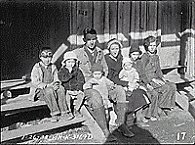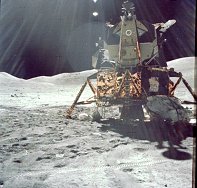
Services for the Public
See Also: Friends of the National Archives Southeast Region web site.
Genealogy Research
The Atlanta facility has extensive microfilm holdings of value for genealogy research, among them:
- Federal population censuses for all States, 1790-1930;
- indexes for all censuses through Ancestry.com;
- selected military service records and indexes;
- selected pension and bounty-land warrant applications;
- indexes to selected passengers arrival records for Eastern and Gulf Coast ports;
- indexes to selected naturalization records processed through Federal courts throughout the Southeast;
- selected records relating to Native Americans and African Americans.
Researchers using microfilm do not need a researcher's ID card.
Additional help
-
View our Family History Sources brochure
- Friends of the National Archives Southeast Region web site.
- Hire an Independent Researcher (non-NARA staff)
- Archival Holdings Related to Family History at the National Archives at Atlanta
- Archival Holdings Related to African American History at the National Archives at Atlanta
- NARA's Online Microfilm Catalog, which allows researchers to determine the microfilm publications held by the Atlanta facility.
- NARA's Genealogy Section, for general information about NARA's genealogical resources.
-
Genealogy Links from the Archives Library and Information Center (ALIC), with links for how to do genealogical research, genealogy resources around the world, and databases of family trees.
- Genealogical Resources on the World Wide Web, for links to other non-NARA genealogical web sites.
E-mail your inquiry to atlanta.archives@nara.gov.
Call the Atlanta facility at 770-968-2100.
Historical Research (including Court records)
Original records
Note: If you are looking for Court Records in the Southeast Region that are less than 25 years old, learn more here.
The National Archives at Atlanta has approximately 175,000 cubic feet of archival holdings dating from 1716 to the 1980s, primarily textual records but also maps, photographs, and architectural drawings. These records were created or received by the Federal courts and over 100 Federal agencies, and are unique evidence of the impact of Federal government policies and programs in Alabama, Florida, Georgia, Kentucky, Mississippi, North Carolina, South Carolina, and Tennessee. Federal law requires that agencies transfer permanently valuable, noncurrent records to NARA.
Among the subjects included are: the Vice Admiralty Court of the Province of South Carolina, the evolution of Federal courts, Constitutional rights, the Civil War and reconstruction, economic development, business, organized crime, invention, the arts, censorship, World Wars I and II, the New Deal, and space exploration. Historic names in the files include Wernher Von Braun, Andrew Johnson, David Lilienthal, Martin Luther King, Jr., and Andrew Young.
The National Archives at Atlanta also has custody of thousands of photographs and negatives, primarily from the Tennessee Valley Authority (TVA) and the National Aeronautics and Space Administration (NASA). Of the approximately 779,000 photographs and negatives of the Tennessee Valley are photographs of families, homes, towns, and buildings in the area, many of which have vanished. The NASA collection includes approximately 385,586 still pictures and negatives from the Kennedy Space Center in Florida and the Marshall Space Flight Center in Huntsville, Alabama.
The archival holdings are arranged by record group (abbreviated RG), a body of records from an agency or bureau, identified by an RG number. Selected finding aids, are available by mail and online. Research can be initiated in person, or by telephone, mail, or electronic mail at atlanta.archives@nara.gov.
Individuals who wish to use archival holdings on-site will facilitate their research by calling before visiting.
Before using archival holdings, every researcher must obtain a researcher identification card. An applicant must show identification that includes a photograph, such as a driver's license, passport, or school or business identification card, and complete a short form giving name, address, telephone number, and a brief description of the proposed research topic. A researcher ID card, valid for 1 year and renewable, is then issued. It must be presented during each research visit. The card cannot be issued in advance of your visit.
Although researchers are welcome until closing time, no records will be pulled after 4:00 P.M.
Microfilmed records
In addition to unique original records, the Atlanta facility has extensive holdings of National Archives microfilm publications. These publications reproduce basic documentation for the study of history, economics, public administration, political science, law, ethnology, genealogy, and other subjects. Included are records relating to U.S. diplomacy, the Revolutionary War, the Civil War and Reconstruction, Native American-Government relations, westward expansion, and World War II.
Researchers using microfilm do not need a researcher's ID card.
Photocopying
Self-service copying of archival documents is available for 25 cents a page (letter and legal size.) Upon request, the staff will make or arrange for copies of oversized documents, certified copies for legal use, photographs, or other specialized copies. Fees vary depending on size and type of reproduction. The availability of photocopies depends on the physical condition of the documents.
Paper copies from microfilm can be made at self-service copiers.
Public Programs
Public programs include workshops on genealogy, research in archives, and teaching history using archival documents; tours of the facility; student internships; exhibits; and lectures. Groups and classes can be accommodated by special arrangement.
 Photo in the Southeast Region s holdings. Family Residing in house number 1125, Cairo Hollow, 1938, Wheeler Dam, AL.
Photo in the Southeast Region s holdings. Family Residing in house number 1125, Cairo Hollow, 1938, Wheeler Dam, AL. Photograph in the Southeast Region s holdings. Apollo-17 Flight, Marshall Space Flight Center, 1972, Huntsville, AL.
Photograph in the Southeast Region s holdings. Apollo-17 Flight, Marshall Space Flight Center, 1972, Huntsville, AL.